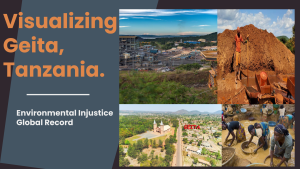Visualizing Geita
xxxx

xxxx

Individuals who have been involved in a traumatic event are considered a vulnerable population, especially those who have been involved in something like a sexual assault. Those who have been victimized often have very little knowledge of the services available to them or the nuances of the systems with which them must interface. Thus, these individuals (after coming off a severe emotional and physical trauma), must then navigate a complex system that often feels biased towards the accused. This report summarizes their experiences and the shortcomings of this system.
1) Fukushima's nuclear safe guards followed the current accepted nuclear regulations. In addition to having back-up generators and short-term batteries to support the reactors during power failure, ownership had extensive emergency plans for tsunamis. These were executed and creative solutions were utilized with necessary. This then begs the question as to how such a well-prepared facility experience massive devastation.
2) Japan is known to be a first-world nation constantly innovating and exploring new technology, with an advanced economy and high emphasis on education. Dr. Schmid refers to members of the Japanese government as "scientifically trained, technologically savvy elites." While Dr. Schmid acknowledges nuclear energy to still be a murku field, Japanese officials represent the individuals most capable of making informed, knowledgeable decisions about nuclear facilities. This only further emphasizes her assertion that a set, elite organization needs to be created to handle nuclear emergencies.
3) While several organizations exist to discuss nuclear power on an international level, there is no entity which serves as a governing body over nuclear facilities. Nuclear emergencies very quickly spread from single-nation disasters to international events. Although there are many internationally recognized policies and guidelines, there is no body to ensure these are followed. Moreover, no single nation or organization at the present time has the fiscal capabilities or specialized knowledge to aid during nuclear disasters.
Currently, BSVAC survives on state and community funding. However, as recently as 2014 the agency was being funded by the Commander's pension and funds from re-mortgaging his home. At present time, BSVAC has also received a check from Councilman Cornegy for their timely, professional response to violent crimes involving police officers and for general service to the community. As it stands, BSVAC runs on a budget of approximately 250,000 per year, mostly through donations and legislative grants.
When administering healthcare or combating epidemics, there's often an unaddressed social factor. Far more often, the focus remains on the scientific and biological aspects of the disease without delving into the social circumstances surrounding its prevalence. Healthcare typically narrows the scope to just medical intervention, instead of looking at the overarching conditions. Farmer and his colleagues give several examples of successful bio-social interventions; these methods allow physicians and healthcare workers to successfully treat patients in all aspects of the disease. Moreover, they contend that treating epidemics in this way helps to prevent the manifestation of social inequalities in healthcare.
"'Environmental Justice and Cumulative Impacts' is intended to create stronger environmental and land use policy tools at the local level to prevent and mitigate additional pollution associated with a variety of development and redevelopment projects. It also addresses environmental justice by helping to prevent Newark, which has a disproportionate number of low-income and residents of color, from having a disproportionate number of polluting projects placed within its borders" (Hislip par. 1).
"showed a graph developed by environmental justice community organizers, which detailed the differences between communities that experience pollution versus the predominant race of those communities, which showed that as the number of people of color or the level of poverty in a neighborhood increased, so too did the cumulative impacts. In New Jersey, the amount of pollution you experience is directly correlated to your income and skin color" (Hislip par. 5).
"She explained that zoning laws in Newark are slowly changing, including rezoning and getting rid of outdated rules that were grandfathered in. But the impacts from the pollutants that were allowed to run rampant are very evident. Before Newark’s zoning laws were updated in 2012, the last time they had been updated was in 1954 and therefore had little regard for quality-of-life issues. The Ironbound district later became a hotbed for environmental justice movements due to its adjacency to industrial areas. Many heavy pollutants that were planned for this area saw heavy protest from EJ activists, like automobile shredding plants and chicken crematoriums" (Hislip par.8).
"The ordinance itself requires individuals applying for commercial or industrial developments within Newark to take the following steps:
The authors are Stephen Collier, PhD and Andrew Lakoff, PhD. Both hold associate professor positions-- the former at New University in NYC and the latter at USC Dornsife. Lakoff's research and publications seem to focus primarily on public health, global medicine, and medical anthropology. Collier, conversely, seems to primarily work on projects pertaining to government structure and its effects on human life. These include publications on economics, environment, historical, and biopolitics.
During the super storm Hurricane Sandy, NJPAC decided to set aside 2000 tickets for several different performances. Each ticket was priced at $25, and 100% of those profits would go straight to the support relief for those affected by the super storm.
Dr. Knowles discusses the role and nature of investigations after disasters, particularly in regard to engineering and structural aspects. He primarily draws parallels between the delayed and botched engineering investigations after 9/11 and several similar historical disasters. Dr. Knowles contends these investigations can drastically effect how the public interprets disaster response; yet, it is often overlooked by officials until demanded by public outcry.
Artisanal or Snall Scale Mining in Geita.